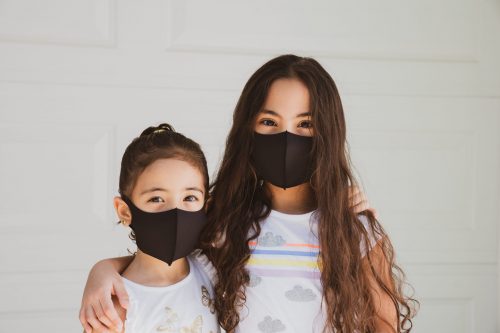December 21, 2023
It’s Virus Season: Protect the Kids from the Flu, RSV, and COVID-19!
As the seasons change and the winds are picking up, it's time to think about protecting our little ones (and ourselves!) from these three viruses!

What is influenza?
The flu, or influenza, is a sickness that can give us a stuffy nose, cough, sore throat, fever, headaches, and more! It can be especially tough for young kids and might even lead to serious problems like ear infections or pneumonia.
The flu and the common cold have similar symptoms, so check out this table to below to learn about the differences!
SIGNS AND SYMPTOMS | COLD | FLU |
Symptom Onset | Gradual | Abrupt |
Fever | Rare | Usual |
Aches | Slight | Usual |
Chills | Uncommon | Fairly common |
Fatigue, Weakness | Sometimes | Usual |
Sneezing | Common | Sometimes |
Chest discomfort, cough | Mild to moderate | Common |
Stuffy Nose | Common | Sometimes |
Sore Throat | Common | Sometimes |
Headache | Rare | Common |
What is RSV?
Respiratory syncytial virus (RSV) is another sickness that can affect our lungs and breathing. It might feel like a simple cold for older kids, but it can be really serious for infants.
What is COVID-19?
COVID-19, also known as coronavirus disease, is caused by the SARS-CoV-2 virus. While most people will experience mild to moderate respiratory symptoms, some groups may become seriously ill such as our grandparents or family members who are already sick.
How do we protect ourselves against these viruses?
One way that we can protect ourselves from these viruses is through vaccines!
- The flu shot is a vaccine that protects us against getting the flu and its possible complications. Not only are we protecting ourselves, but we are also protecting the people around us!
- To prevent severe RSV, there are two choices: an antibody product called nirsevimab (Beyfortus) or a vaccine for pregnant people called Abrysvo.
- The COVID-19 vaccines protect against serious symptoms of COVID-19 such as hospitalization and death. Keeping up with the COVID-19 vaccines can also help restore protection from the last vaccination.
Who can get the vaccine?
Flu Shot:
- The Centers for Disease Control and Prevention (CDC) recommends anyone 6 months and older to get the flu shot annually. It also takes up to two weeks to be protected from the flu after receiving the vaccine.
- Some children might need two doses of the vaccine. If you’re between 6 months and 8 years old and haven’t had a flu shot before July 1, 2023, you might need two shots, given 4 weeks apart.
- If you’re 9 or older, one shot is usually enough. If you’re younger than 9 but got two shots at least 4 weeks apart before July 1, 2023, one shot should be enough.
RSV:
- Babies under 8 months born during or at the start of their first RSV season can receive the Beyfortus shot. It is also for children between 8 months and 19 months who are at higher risk of severe symptoms.
- Abrysvo is a vaccine that pregnant people can get in between 32 to 36 weeks of pregnancy to prevent RSV in infants from birth to 6 months of age.
COVID-19 Vaccine:
- For the 2023-2024 season, the CDC recommends these updated three vaccines: Pfizer-BioNTech, Moderna, or Novavax.
- The Pfizer and Moderna vaccines are mRNA-based while the Novavax is a traditional inactivated virus protein vaccine.
- Everyone 5 years old or older should get 1 dose of the COVID-19 vaccines, and children aged 6 months to 4 years of age need multiple doses of the vaccines, with at least 1 of those doses being an updated vaccine.
